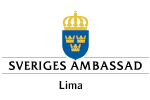 05 October 2011 - A meeting was held on 5th October 2011 in New Delhi between Union Minister for Housing & Urban Poverty Alleviation (HUPA) and Culture Kumari Selja and Mr. Hernando de Soto, Peruvian Economist and President, Institute of Liberty and Democracy (ILD), Peru to discuss a project focusing on the legal empowerment of the poor in India. Also present at the meeting were Shri Arun Kumar Misra, Secretary, HUPA, His Excellency, Mr. Javier Paulinich, Ambassador of Peru to India and Mr. Luis Triveño, CEO, ILD.
05 October 2011 - A meeting was held on 5th October 2011 in New Delhi between Union Minister for Housing & Urban Poverty Alleviation (HUPA) and Culture Kumari Selja and Mr. Hernando de Soto, Peruvian Economist and President, Institute of Liberty and Democracy (ILD), Peru to discuss a project focusing on the legal empowerment of the poor in India. Also present at the meeting were Shri Arun Kumar Misra, Secretary, HUPA, His Excellency, Mr. Javier Paulinich, Ambassador of Peru to India and Mr. Luis Triveño, CEO, ILD.
The project will undertake a diagnosis to assess the extent of insecure property titling, the reasons for it, its most common practices and suggestions of ways in which this wealth can be unlocked for the use and benefit of the poor. The project will focus on three states (one city per state) for the diagnosis.
In particular a diagnosis report will be submitted by the project containing a description of the sector, identification of legal and institutional bottlenecks, stakeholders, identification, analysis, description and categorization of the main informal practices, that, in response to the legal obstacles, take place outside the rule of law, and identification of relevant public sector ‘machinery’ and its impact on the institutional framework. In addition, the project will also suggest an institutional reform design building on the diagnosis facts and including recommendations for: (i) building incentives for people to record their property; (ii) building incentives for informal businesses to abide by and benefit from the rule of law; and (iii) building consensus for reform.
It is expected that this project will propose institutional changes and reforms from the diagnosis phase that will pave the road for large-scale, national implementation of these reforms for a more inclusive urban growth in India.
To read the original article, please see Press Information Bureau, Government of India


